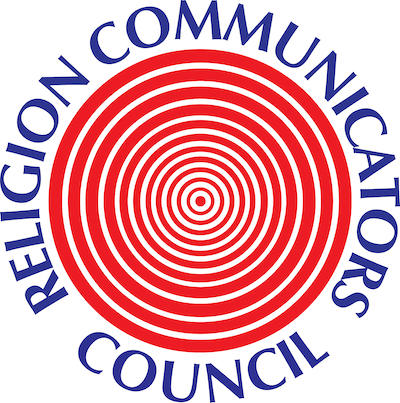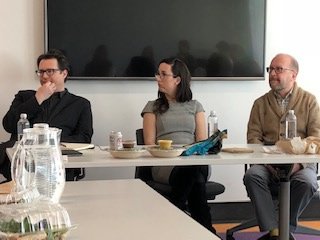A “legacy audience” from a long-running public television show will not necessarily transfer to the world of podcasting.
That was one of the learnings for Jonathan Woodward, the producer of a podcast called “Beliefs.” Developed with Bill Baker, the former president of WNET-TV who helped launch “Religion and Ethics Newsweekly,” “Beliefs” is a collaboration of Religion News Service and Fordham University.
In three and half months, Woodward said, “We’ve gone from understanding that audience does not exist to realizing that our marketing strategy to find (an) audience has to be episode to episode.”
A discussion about progressive politics inside liberal Jewish spaces in Brooklyn, for example, means the audience — “for better or worse” — will be progressive Jews in New York, Israel and a few other communities.
“Since we shifted that audience strategy, it was immediately much more effective,” he said.
Woodward was part of a panel discussion on religious podcasting during the March 19 meeting of the New York Chapter of Religion Communicators Council. The event took place in the offices of United Methodist Women at the Interchurch Center, 475 Riverside Dr.
Joining him were Kevin Childress and Maggi Van Dorn, co-founders of the “Interfaith Matters” podcast of the Interfaith Center of New York. Childress is the podcast’s executive producer and also works as a content marketing consultant for faith-related non-profits. Van Dorn currently is the producer of “Deliver Us,” a podcast about the sexual abuse crisis in the Catholic Church.
A former Catholic high school teacher, Van Dorn had no podcasting experience when she pitched the idea of doing a “This American Life” of religious life to Childress.
That public radio program is considered an obvious progenitor of podcasts, a recent article in New York magazine points out. The magazine’s March 18-31 cover story on “The Golden Age of Pods” reports that some 660,000 podcasts are now “competing for your attention.”
The Interfaith Center of New York already had a blog called “Spotlight” aimed at strengthening relationships with faith leaders. Childress liked the idea of turning that concept into a podcast.
So, four years ago, they bought a multidirectional microphone and an iPad and split up the producing duties. Van Dorn did interviews and learned how to edit; Childress uploaded the podcast to the server and handled all the promotion with the Interfaith Center’s network. By the end of the second year, they had a studio and Van Dorn was working as a full-time volunteer.
For the most part, “Interfaith Matters” airs monthly, Childress said, but with enough flexibility for an occasional hiatus. Three episodes are in development at any given time and can have topical, educational or even a fundraising-related focus. “A lot of our content is focused on the intersections of faith and social justice activism,” he added.
Van Dorn eventually was recruited by Sirius XM to curate religion and spirituality content. To replace her and keep the podcast going, Childress said, “We put the word out everywhere we could and got a huge response.” A volunteer sound engineer, an editor and a host have all committed to a second year for the podcast, he said.
Van Dorn’s current podcast focuses “on the big questions” surrounding the Catholic sexual abuse crisis. “I wanted it to be for a general audience, but at the same time, I had to be realistic about who was really going to be my most engaged audience and who I was creating this for,” she explained. “I’m creating this for Catholics to hold their own faith community accountable.”
She produces “Deliver Us” with her podcasting team at Sirius but had to find a partner, particularly for promotion. America Media, a Jesuit content provider for Catholics, turned out to be the right fit, and provided a pre-existing target audience.
Van Dorn said she was impressed with the level of engagement with “Deliver Us” and the audience interaction through social media and email. “I think we’ve really struck a nerve and people are responding to that.”
Woodward agreed with that assessment. “Maggie works on some really intense journalism which is the gold standard of what podcasting can do,” he said.
“Beliefs,” which covers all faiths with more generalized content, has a different format, he explained. The weekly podcast is designed to provide “fact-checked innovative conversations on current events.”
The objective is to “dial in” on breaking news. “Two weeks ago, we had the guy from the Houston Chronicle on the line and we sat down with him for a conversation about how he broke a story of 700 cases of abuse in 20 years in the Southern Baptist Convention,” Woodward said.
Here are some tips from the podcasting panel:
- Figure out content objectives for the podcast while in the planning stages.
- Use a podcast to “super-serve” a particular community by letting a built-in audience know what the organization is doing and how they can be more active.
- Consider volunteers if there is no budget for a paid staff. The experience will be valuable, but also look for ways to offer small compensation.
- If a studio is not available, record in a room with a lot of books and furniture to diminish echoes. Turn off anything in the room that could make a sound.
- Check out inexpensive options for recording remote interviews. Or, for about $150 an hour, hire a freelance producer to do remote interviews.
- Take advantage of cross-promotion opportunities with guests or other organizations featured in a podcast episode.
- Search online to see how other podcasts are doing underwriting.
Bloom is the assistant news editor for United Methodist News Service.

